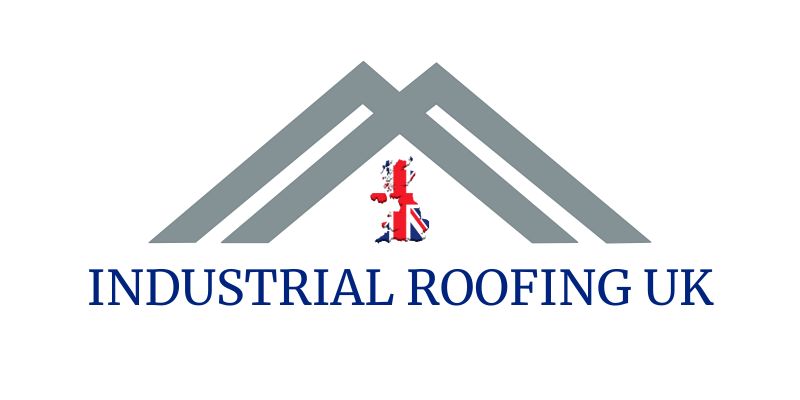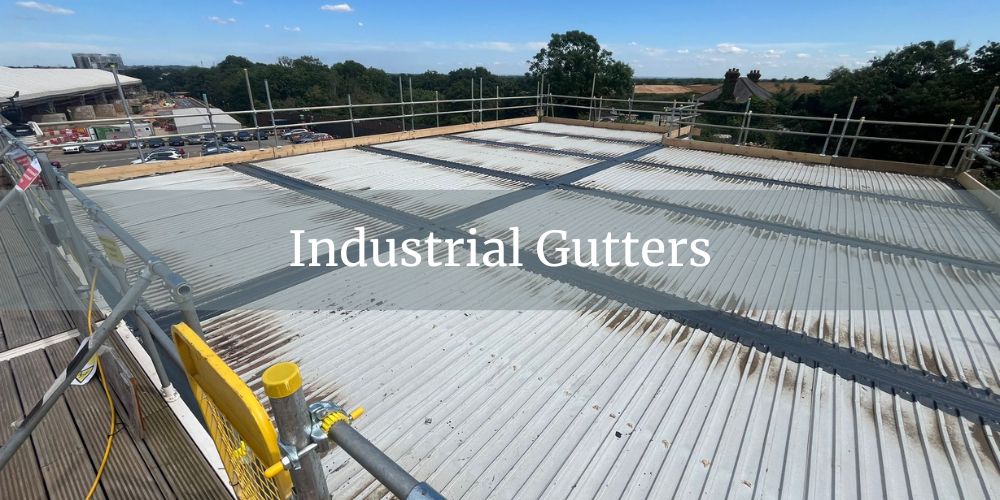Industrial roof gutters refer to the drainage systems installed along the edges or in the centre of industrial roofs to channel rainwater and debris away from the building. These systems are designed to handle large volumes of water, preventing accumulation that can lead to leaks, structural damage, and corrosion. Well-maintained industrial roof gutters are crucial for protecting the building’s integrity, reducing maintenance costs, and ensuring a safe working environment. Keeping these drainage systems in good condition helps maintain the overall health and functionality of the facility, offering peace of mind and reliable performance.
Industrial Roofing UK provide complete industrial roof gutter solutions across the UK, ensuring efficient water management and protecting large-scale facilities from drainage-related damage. We specialise in the installation, repair, and maintenance of high-capacity gutter systems designed to handle the demands of industrial buildings such as factories, warehouses, and processing plants. Our services include replacing failed joints, resealing gutter seams, clearing blockages, and upgrading outdated systems. With nationwide coverage and minimal disruption to your operations, we help prevent leaks, structural deterioration, and costly water ingress through reliable, long-lasting guttering solutions.
What Are Industrial Roof Gutters?
Industrial roof gutters are robust drainage systems designed to manage large volumes of water on the roofs of industrial buildings such as factories, warehouses, and manufacturing facilities. These gutters are essential for directing rainwater away from the roof and foundation, preventing water damage and structural issues. Typically made from durable materials like galvanised steel, aluminium, or PVC, industrial gutters are built to withstand harsh weather conditions and heavy loads. According to the Building Research Establishment (BRE), effective gutter systems are crucial for maintaining the integrity of industrial roofs and preventing costly repairs due to water damage.
The design of industrial gutters includes features such as larger capacities and more efficient downspouts compared to residential systems, ensuring they can handle significant rainfall without overflowing. Regular maintenance, including cleaning and inspection, is vital to keep these gutters functioning properly. The National Federation of Roofing Contractors (NFRC) recommends routine checks to remove debris and address any blockages or damage promptly. By ensuring proper water management, industrial gutters help maintain the safety and longevity of industrial buildings, supporting their overall operational efficiency.
Have a question about an upcoming project?
What Are The Different Types of Industrial Roof Gutters?
The different types of industrial roof gutters are box gutters, half-round gutters, K-style gutters, fascia gutters, PVC gutters, and various metal gutters.
- Box Gutters
- Half-Round Gutters
- K-Style Gutters
- Fascia Gutters
- PVC Gutters
- Metal Gutters (Aluminium, Steel, and Copper)
1. Box Gutters
Box gutters are a fundamental type of industrial roof gutter designed to handle substantial water flow from large roofs. These gutters are typically integrated into the edge of the roof or positioned between two slopes, providing a streamlined appearance and efficient water drainage. Their large capacity makes them ideal for industrial buildings experiencing heavy rainfall, ensuring no overflow occurs. Additionally, their design helps reduce maintenance efforts by effectively directing water away from the structure.
2. Half-Round Gutters
Half-round gutters are a classic choice for industrial roof gutters, known for their semi-circular shape resembling a half-pipe. This design is not only visually appealing but also highly effective at managing water flow. Half-round gutters are easy to clean and less prone to clogging, making them a reliable option for industrial buildings. Their smooth, curved shape allows water to flow freely, reducing the risk of blockages and corrosion over time.
3. K-Style Gutters
K-style gutters are a popular option for industrial roof gutters due to their flat back and bottom with a decorative front that mimics crown moulding. This shape allows them to handle a larger volume of water compared to other styles, making them suitable for industrial applications. K-style gutters are relatively straightforward to install and maintain, providing a practical solution for effective water management on industrial roofs. Their sturdy design ensures they can withstand heavy rainfall and environmental stresses.
4. Fascia Gutters
Fascia gutters are an integral component of industrial roof gutters, combining the functions of the fascia and the gutter into one system. These gutters are directly attached to the fascia board under the roof edge, providing a neat and streamlined look. Fascia gutters are highly effective in areas with heavy rainfall, as they can manage large volumes of water efficiently. Their design helps in preventing water from damaging the building's structure, extending the roof's lifespan.
5. PVC Gutters
PVC gutters are a cost-effective and practical choice for industrial roof gutters, made from lightweight polyvinyl chloride material. These gutters are easy to install and maintain, offering resistance to rust and corrosion. PVC gutters are ideal for industrial settings where low maintenance and durability are crucial. Their plastic construction makes them less susceptible to damage from the elements, ensuring long-lasting performance.
6. Metal Gutters (Aluminium, Steel, and Copper)
Metal gutters, including aluminium, steel, and copper, are robust options for industrial roof gutters. Aluminium gutters are lightweight and rust-resistant, making them easy to install and durable. Steel gutters are extremely strong and can handle heavy loads, although they may need a protective coating to prevent rust. Copper gutters, while more expensive, offer unmatched durability and a unique aesthetic. These metal gutters are well-suited for harsh industrial environments, providing long-lasting protection and efficient water management.
What Is The Purpose Of Industrial Guttering?
The purpose of industrial guttering is to manage and direct rainwater away from the roof and foundation of industrial buildings. By effectively channelling water, guttering systems prevent water build-up which can lead to leaks, structural damage, and costly repairs. Industrial gutters also protect the building's exterior and landscape from erosion and water damage, ensuring the long-term stability and strength of the structure. Additionally, well-maintained gutter systems enhance the overall efficiency of the building’s drainage, contributing to a safer and more resilient industrial facility. According to the National Federation of Roofing Contractors, proper gutter maintenance can extend the lifespan of a building’s roof by up to 20%.
Are There Any Differences Between Guttering on Industrial and Commercial Buildings?
Yes, there are differences between guttering on industrial and commercial buildings. Industrial buildings often require larger, more durable gutter systems to manage the substantial volume of water flow from extensive roofs. Industrial gutter systems are typically designed to endure harsh environmental conditions and significant debris loads.
In contrast, commercial buildings, which may have smaller roofs, often use gutter systems that are less heavy-duty. Commercial guttering may focus more on aesthetics and integration with the building's design, alongside effective water management. While both types of buildings need efficient drainage solutions, the scale, robustness, and sometimes the materials used in the gutter systems can vary significantly. According to the National Federation of Roofing Contractors, industrial gutters often have a capacity 50% greater than those used in commercial settings to accommodate large roof areas.


